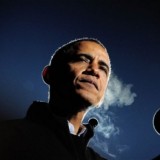The world’s largest and most influential political and economic forces are showing signs that they might be ready to actively combat climate change. Presently the signs are only words. But the words are unequivocal and dramatic enough to be interpreted as a prelude to eventual concrete action at a global level.
Undoubtedly these words have been hastened by the collapse of a successor to the landmark Kyoto Protocol, the only legally binding international agreement to reduce greenhouse gas emissions. This collapse was followed by the abject failure of subsequent negotiations. Extreme global weather events have now become so anomalous and conspicuous that they can no longer be denied as normal.
Such events are clearly sobering to those who are supervising the wellbeing of the global economy. They see trouble proliferating if something isn’t done soon to reduce the climate threat. Even US President Barack Obama, emboldened by a re-election victory and facing a last term in office, is taking an assertive position, uncharacteristically forceful and visionary (Elizabeth May, Feb. 14/13).
In his January 21st inauguration address to his fellow Americans — and to the people of the world because of the global influence of the United States — he sounded heroic. “We will respond to the threat of climate change, knowing that the failure to do so would betray our children and future generations. Some may still deny the overwhelming judgment of science, but none can avoid the devastating impact of raging fires and crippling drought and more powerful storms…”
Obama is responding appropriately to the growing anxiety in America about a future made uncertain by strange weather. But he also sees opportunity in adversity. “We cannot cede to other nations the technology that will power new jobs and new industries; we must claim its promise” (Ibid.). Obama’s new Secretary of State, John Kerry, also spoke of climate change and the need for remedial action from the international community, a sure sign that the level of awareness and commitment has reached a critical threshold.
More justification for optimism came from Christine Lagarde, the director of the International Monetary Fund. The IMF has been notorious for financing environmentally destructive projects in the interests of economic development — it hasn’t subscribed to the aphorism that the economy is a wholly owned subsidiary of Nature. But Lagarde’s speech in Davos, Switzerland, in late January revealed a different awareness. After outlining the major threats to global economic stability, she conceded that climate change was the most worrisome, “the greatest economic challenge of the 21st century.” In elaborating, she added that, “Increasing vulnerability from resource scarcity and climate change, with the potential for major social and economic disruption; this is the real wild card in the pack.”
But Lagarde’s most candid comments came during the question period that followed her speech. This is a time when the carefully edited words of a formal presentation are replaced by candid opinion. “Unless we take action on climate change,” she said, “future generations will be roasted, toasted, fried and grilled” (Ibid.).
A normal and predictable climate, Lagarde recognized, is the single most important prerequisite for healthy economies — global, national and local. It is foundational and essential. Environmental chaos causes economic chaos, not to mention political, social and cultural chaos. Nothing functions well when communities and their complex infrastructures are buffeted by extremes and unpredictables, exactly what will happen if climate change is not addressed.
A similar expression of concern came from the new president of the World Bank, Jim Yong Kim. On January 28th he used an article in the Washington Post to address the American people directly. “After the hottest year on record in the United States — a year in which Hurricane Sandy caused billions of dollars in damage, record droughts scorched farmland in the Midwest and our organization reported that the planet could become 7 degrees [Fahrenheit] warmer — what are we waiting for? We need to get serious fast. The planet, our home, can’t wait” (Ibid.).
Good question. What are we waiting for? The physics that determines global climate doesn’t understand excuses: the complications of international negotiations, the politics of domestic economics, the awkwardness of national recessions, the procrastinations of powerful leaders. Neither does it understand the interests of large corporations, the inconvenience of constructing low-carbon technologies, the stubborn reluctance of old ideologues to accept new modes of behaviour more befitting our environmental reality.
The longer we wait to reduce greenhouse gas emissions, the more extreme the cuts must be, the more difficult they will be to implement, and the more likely they will have to be made in increasingly adverse economic, social and political conditions. People in powerful places are beginning to realize this. Hopefully, their words will be an impetus to action.


Sunday, 17 March 2013 00:34 posted by Roger Kemble
and this . . .
http://www.youtube.com/watch?v=n92YenWfz0Y&feature=player_embedded#!
Sunday, 17 March 2013 00:29 posted by Roger Kemble
Ray, Maybe this . . .
http://www.dailymail.co.uk/news/article-2294560/The-great-green-1-The-hard-proof-finally-shows-global-warming-forecasts-costing-billions-WRONG-along.html
. . . will take the smirk off your physog!